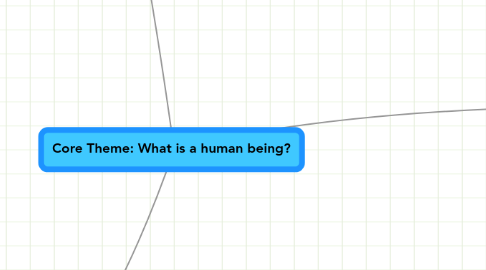
1. Epistemology
1.1. Scepticism
1.1.1. Sceptics makes the distinction between practical certainty and metaphysical certainty.
1.1.1.1. Practical certainty
1.1.1.1.1. Certainty gained from confidence.
1.1.1.1.2. E.g. "I am certain that it will hurt if I fall"
1.1.1.1.3. Many arguments against Skepticism uses practical certainty as the main argument.
1.1.1.2. Metaphysical certainty
1.1.1.2.1. Certainty of confidence - is confidence fully justified?
1.1.1.2.2. Makes distinction between accurate and precise knowledge claims.
1.1.2. Rationalism
1.1.2.1. Plato
1.1.2.1.1. Knowledge came first through 'world of ideas'.
1.1.2.2. Descartes
1.1.2.2.1. 'I think, therefore I am' - reaction against Scepticism
1.1.2.2.2. Took skeptical perspective to reach to his conclusion.
1.1.2.2.3. However difficulty comes from affirming anything else about reality.
1.1.3. Empiricalism
1.1.3.1. Aristotle
1.1.3.1.1. Knowledge came first through senses
1.1.3.1.2. So called 'forms' is in fact just your own innate reasoning organizing objects into certain categories
1.1.3.2. Realism
1.1.3.2.1. Direct Realism
1.1.3.2.2. Representative Realism
1.1.3.3. Idealism
1.1.3.3.1. Berkeley's Idealism
1.1.3.3.2. Reaction against Locke's Realism
1.1.3.3.3. Accepts the fact that we cannot know of the world that is other than our senses
1.1.3.3.4. So questions why there is a need to define an external reality
1.1.3.3.5. Wholly relies on sensory perception to know
1.1.3.3.6. Counter Arguements
1.1.3.3.7. Phenomenalism
2. Philosophy of Mind
2.1. Dualism
2.1.1. Problems
2.1.1.1. When did we start to have minds?
2.1.1.1.1. Darwin's Theory of Evolution
2.1.1.1.2. Conception to Birth
2.1.1.2. How do does mind/body interact?
2.1.1.3. The problem of other minds
2.1.2. Plato
2.1.2.1. Provided first insight of Dualism
2.1.2.2. Recognized a split between two worlds
2.1.2.2.1. The world of forms
2.1.2.2.2. The world of appearance
2.1.3. Substance Dualism
2.1.3.1. Descartes
2.1.3.2. 'I think therefore, I am'
2.1.3.2.1. A reductionist approach
2.1.3.2.2. I can deny the existence of everything I perceive
2.1.3.2.3. But I cannot deny the existence of my conscious self therefore I must exist
2.1.3.3. Counter arguments
2.1.4. Epiphenomenalism
2.1.4.1. 1-way interaction
2.1.4.1.1. Body to mind only
2.1.4.1.2. Our mind receives sensory input
2.1.4.1.3. However our mind cannot respond back physically
2.1.4.2. Mental events are of secondary phenomenon
2.1.4.2.1. The mind is left as an observer
2.1.4.3. Therefore they cannot affect causal chain of events
2.1.4.4. Counter arguments
2.1.4.4.1. Impossible to know if other people have conscious experiences
2.1.4.4.2. No distinction between a Human being and an android
2.1.4.4.3. Goes back to the original problems of distinguishing a machine from a human being.
2.1.5. Parallelism
2.1.5.1. No interaction between mind and body
2.1.5.2. Mental events are synchronized with physical events
2.1.5.2.1. Both entities are under the same clock
2.1.5.2.2. Clock is maintained by God who provides the harmony
2.1.5.3. Counter arguments
2.1.5.3.1. There is evidence of body affecting mind
2.1.5.3.2. e.g. When I am drunk, it impairs judgment
2.1.5.3.3. Thus physical events does affect mental activity
2.2. Monism
2.2.1. Physicalism
2.2.1.1. (see metaphysics)
2.2.1.2. Behaviourism
2.2.1.2.1. Proposes that questions such as "What is the mind?" are pseudo-questions.
2.2.1.2.2. Mental language is paraphrased based on behavioral propensities (what one is likely to do).
2.2.1.2.3. Counter arguments
2.2.1.3. Identity Theory
2.2.1.3.1. Maintains that mental events are the same as physical events in the brain
2.2.1.3.2. Can be compared to H20 and water
2.2.1.3.3. Terms 'mind' and 'brain' are interchangeable
2.2.1.3.4. Counter arguments
2.2.1.4. Functionalism
2.2.2. Epistemological Idealism
3. Metaphysics
3.1. Fatalism
3.1.1. Idea first observed in Greek tragedies
3.1.2. Acceptance of unvarying fate
3.1.2.1. Future events cannot be altered
3.1.2.2. Truth is timeless
3.1.3. Counter arguments
3.1.3.1. Does not explain why future is unalterable
3.1.3.2. Freewill is lost
3.1.4. Determinism
3.1.4.1. Hard Determinism
3.1.4.1.1. Determinism is true, freedom is an illusion
3.1.4.1.2. Monism
3.1.4.1.3. Criticism
3.1.4.2. Everything is determined by prior causes
3.1.4.2.1. Modern science has been based on this assumption
3.1.4.2.2. Questions notion of responsibility
3.1.4.2.3. Counter arguments
3.1.4.3. Events before an occurrence accurately describes that occurrence
3.1.4.3.1. The principle of sufficient reason
3.1.4.3.2. If this holds true, anything can be predicted as long as causes are known
3.1.4.3.3. Thus stock market changes can be predicted if every single factor is known
3.1.4.4. Soft Determinism
3.1.4.4.1. Determinism and freedom are compatible
3.1.4.4.2. Counter arguments
3.1.4.5. Marxism
3.1.4.5.1. Belief in dialectical process as influenced by Hegel
3.1.4.5.2. Recognizes the flaws in religion as pointed out by Feuerbach
3.1.4.5.3. Recognizes class struggles because of rise of capitalism which is fueled by religion
3.2. Free will
3.2.1. Is there a mind and body relation? [philosophy of mind]
3.2.2. Is the universe a purely physical entity?
3.2.3. Metaphysical Idealism
3.2.3.1. Refers to priority of the mind rather than the physical.
3.2.3.1.1. Temporal priority
3.2.3.1.2. Ontological priority
3.2.3.2. Extreme idealists purport that matter does not exist.
3.2.3.2.1. Phenomenalism
3.2.3.3. Kant's form of idealism
3.2.3.3.1. Definitions
3.2.3.3.2. Strict empiricists agreed that Analytic truth and A priori knowledge goes togethor and vice versa.
3.2.3.3.3. Kant said it is possible to have a priori knowledge which is synthetic.
3.2.3.3.4. Metaphysical speculation is false
3.2.4. Existentialism
3.2.4.1. Atheistic Existentialism
3.2.4.1.1. Nietzsche
3.2.4.1.2. Sartre
3.2.4.2. Religious Existentialism
3.2.4.2.1. Kierkegaard
